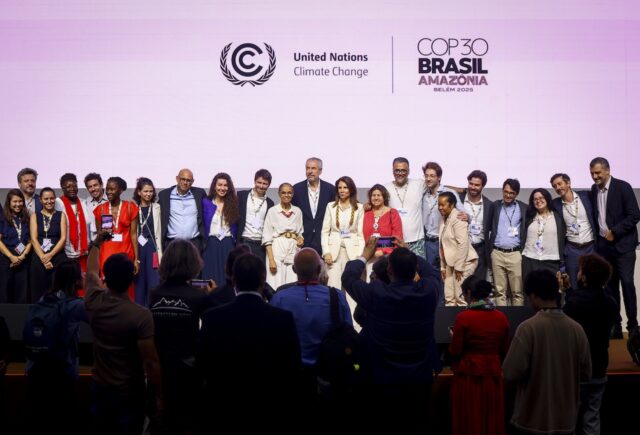With the climate crisis noticeably worsening, impact investors have high expectations, but plenty of concerns as well. Many are calling for more accountability at COP28.

In brief
- Investors are hoping that this year will see more accountability on the three goals of the Paris Agreement through the UN’s first ever global stocktake.
- Investors want to see policy commitments that are consistent, long term and ambitious.
- Governments will be asked to sign a Food Systems Declaration for the first time.
The 2023 United Nations (UN) Climate Change Conference, COP28, will be held from November 30th at the Expo City, Dubai.
The choice of location is contentious. Firstly, the deteriorating military situation in the Middle East presents real problems. One COP28 insider confesses off the record that “COP is being slimmed down because of events, and all the side stuff is now cancelled.”
Phoebe Stone, head of sustainable investing at LGT Wealth Management, points out that COP28 is being seen as controversial, given that this year’s president, Sultan Ahmed Al Jaber, runs ADNOC, the UAE’s national oil company. “The heart of discussion will centre on countries’ plans to move away from fossil fuels. Al Jaber has already referenced the phasing out of fossil fuel emissions, showing his ambition in this area, but he also leaves the door open for these businesses to continue to extract fossil fuels and capture the resulting emissions,” she says.
Rebecca Craddock-Taylor, head of sustainability at Gresham House, shares this concern. “As the hosts are one of the world’s largest producers of oil and gas, I am not particularly optimistic about the outcome for 2023.” With “this obvious conflict…COP attendees will be quick to point out where outcomes are being overly influenced by the interests of the oil and gas industry alone”.
On the other hand, Stone says: “if Al Jaber is able to get the biggest oil and gas producers to reduce [greenhouse gas emissions] in line with 1.5C, this would be an incredible step forward for climate change.”
What are impact investors hoping for?
The big theme for COP28 is accountability. At this year’s COP, the UN will conclude its first ever global stocktake on progress against the three goals of the Paris Agreement (reduce emissions, build communities’ resilience and ensure the allocation of capital to low carbon and climate resilient development). The stocktake is scheduled to take place every five years.
This will not be easy reading, but that itself may be a positive thing. “The extent of the deviation and a collective acknowledgement of failure in that respect could encourage global action and accelerate emissions reduction. The focus at COP28 has to be on how we get back on track and quickly,” notes Craddock-Taylor.
It will also have implications for the Loss and Damage Fund set up last year at COP27. “Impact investors will want to see progress on…how much money wealthy nations will provide via the Loss and Damage Fund,” says Stone.
Victoria Miles, co-chief executive and co-founder of ImpactA Global agrees. “Although there are often expressions of commitment to fund the climate transition in the Global South, the reality is that most funding is still going to the developed world. We want to see real action to tackle this urgent problem.”
Andy Kuper, the chief executive officer of LeapFrog, has a nuanced take on this. “Investors want to see real commitment to funding the types of companies and technologies that enable both mitigation of, and adaptation to, climate change by lower-income people. [There is] increasing recognition that the key to meeting global net zero targets lies in offering emerging market consumers a pathway to leapfrog to low-carbon consumption as they join the middle class.”
For her part, Craddock-Taylor wants to see “market incentives for larger emitters to decarbonise in support of the Just Transition. That way impact investors won’t be restricted to allocating assets to high-risk, untested solutions, and we could see greater levels of decarbonisation as a result.”
She also expects “biodiversity to be a crucial topic, and there will be encouragement for policy development to combine climate and nature action together to enhance impact and efficiency”.
Another theme “that could move the needle” in Stone’s opinion, “is the focus on agriculture and global food systems”. During COP28, governments will be asked to sign a Food Systems Declaration which includes incorporating agricultural and food emissions into national plans to deliver on Paris Agreement goals, given that emissions from food systems represent more than 34% of GHG emissions and more than 40% of methane. “If this does happen at COP28, this would be a significant step forward,” she says.
Stone also thinks commitments to triple renewable deployment and double hydrogen capacity are expected to be agreed by governments at this year’s COP. “This will be good news for impact investors, as it will further increase the focus on the allocation of capital to these areas.”
Investors’ concerns
Not everyone is positive about the situation however. Chris Dodwell, head of policy and advocacy at Impax Asset Management, worries “that a huge amount of effort is put into negotiating carefully crafted agreements on key issues which are then not implemented and eventually forgotten. We need to develop effective processes for holding countries and other stakeholders accountable for their pledges and reporting back on progress at subsequent meetings.”
Craddock-Taylor agrees. “Investors also want to see policy commitments from governments that are consistent, long term and ambitious. The absence of a consistent policy environment for private funding in climate solutions creates an element of risk that is difficult for investors to overcome. The assets and potential financial returns are there, but without policy stability, we won’t see progress.”
She also fears “many at COP will want to distract us from phasing out fossil fuels, by instead talking about how new solutions are required”. She believes the solutions exist – including renewables, battery storage, and building energy efficient homes. But “we are wasting precious time by continuing to debate what new solutions are required today instead of agreeing on how these solutions can be deployed at scale globally.”
Craddock-Taylor is concerned that a focus on carbon capture and storage will end up being a ‘permit to emit’ because companies believe that they will be able to remedy emissions in future with carbon capture technology. “It’s a crucial part of the solution, but we can’t capture and store ourselves to 1.5C. We can’t deploy it retrospectively and we need to reduce emissions today rather than wait for a silver bullet. Many carbon capture and storage solutions are not ready to be used at scale and have so much embedded carbon that the payback period will take years.”
Craddock-Taylor sums up. “We need action today, not in a fabled tomorrow.”






